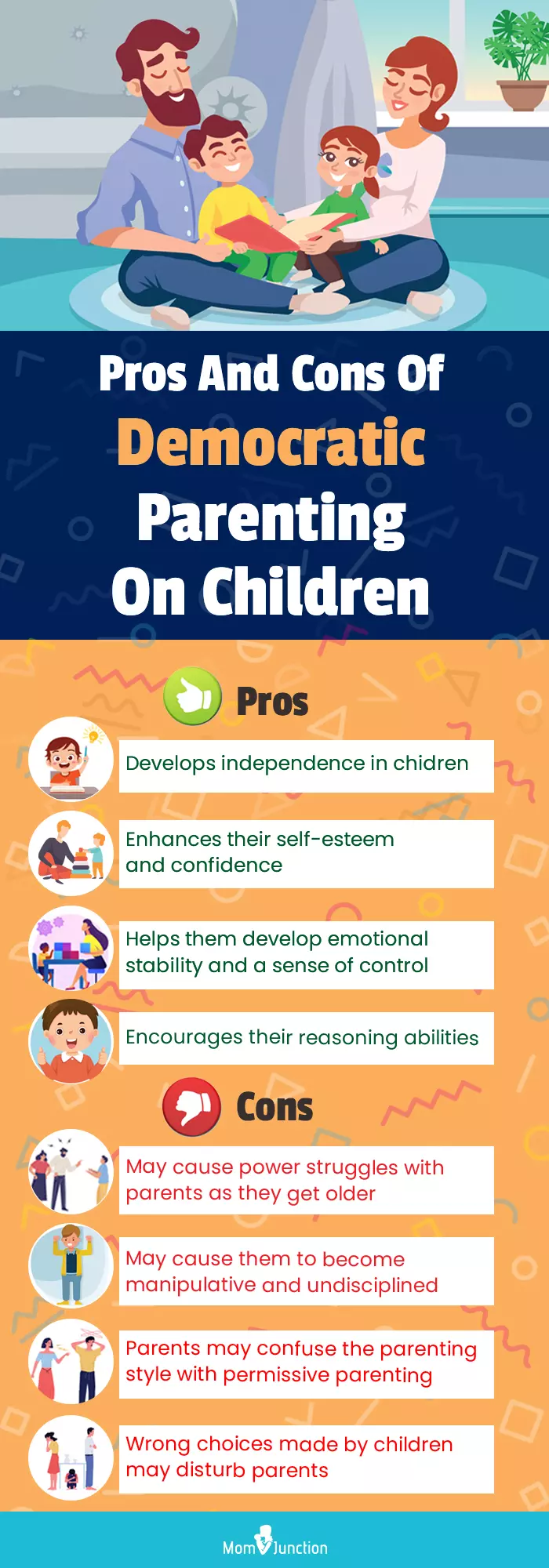
Image: iStock
Democratic parenting is a style of parenting that has its unique features and appeal. While it’s debatable whether this is the best form of parenting, it’s worth considering, as this parenting style can help teach self-discipline and self-regulation in children at a tender age.
If you go by intuition and don’t look at the larger picture of your actions, words, and their repercussions on your child when parenting, it could be counterproductive to their development. While strict discipline is important, you may have to adapt your approach to the child’s capabilities and circumstances to help them grow into responsible citizens. This is where democratic parenting might work. It encourages children to express their opinions and make choices, allowing for independence and autonomy.
Keep reading to learn more about this unique parenting style.
Key Pointers
- Democratic parenting treats children as equals, giving them choices and responsibility for decisions.
- Characteristics of democratic parenting include rule focus, choice encouragement, positive reinforcement, love, warmth, and understanding.
- Benefits of democratic parenting are improved independence, self-confidence, self-esteem, and better school performance.
- Drawbacks of democratic parenting are the need for perseverance, risk of permissiveness, and consequences of wrong choices.
- Tips for democratic parenting include setting boundaries between discipline and free will, keeping communication open, and involving children in rule-making.
Understanding Democratic Parenting

Democratic parenting is a style of parenting that prioritizes empowerment, empathy, and democracy. This approach involves treating children as equals. Parents treat their kids with respect and dignity. Children are given choices and made responsible for their decisions.
However, it doesn’t mean that children can do everything an adult does in the family. Freedom should be given in accordance with their age.
Let’s understand this parenting better by knowing its features.
Characteristics Of Democratic Parenting
Here are the main aspects of democratic parenting:
- Focuses on rules: Democratic parents discuss the rules with their children and explain the importance of having rules. The focus is on making the child understand the rules, instead of punishing them when they break the rules.
- Encourages choice: Democratic parenting style encourages the child to make choices in their daily life. These choices are followed up with consequences. Children thus associate the consequences with their choice.
- Positive reinforcement: Democratic parents reward the child’s positive behavior. They appreciate when they follow the rules and make a good choice. However, the punishment for breaking the rules is not harsh or harmful.
- Responsiveness and motivation: Parents are responsive to the child’s needs and motivate them to achieve their goals.

- Equality and positivity: As the parents treat the child as an equal, they do not force their opinions on them. Instead, they demonstrate open-mindedness and have a discussion as they do with an adult.
- Self-regulation: When parents encourage children to regulate their behaviors and emotions, it teaches them to respond to situations thoughtfully rather than reactively.
- Love, warmth, and understanding: The parents are affectionate and understanding and nurture their children with care.
Democratic parenting is similar to authoritarian parenting style. Let’s see a few examples to understand the concept better.
Examples Of Democratic Parenting
1. Your child dislikes veggies and refuses to eat them. You insist, and he questions you, ‘why should I eat?’ You tell him:

Vegetables have vitamins and minerals that are required for your body. You need to eat them to stay healthy. You should taste them and see. Which one do you want to try, carrots, capsicum, or peas?
2. Your girl comes with a reprimand letter from the school for her misbehavior. She had to meet the school counselor and explain. This is how you react to the letter:
I guess you had a bad day at school, can you tell me what went wrong? (You listen to your child without interrupting and judging her behavior, and then say) You shouldn’t have acted in the way you did because a reprimand letter is a big thing. If you have some problem in the class, talk to the teacher, but first, you should apologize for your behavior.
3. You tell your children to complete their homework before they go out to play or watch television. Your children do not do that. This is what you tell them:
As you have not completed your homework, you cannot go out to play. If you finish it now, you can watch television.
Democratic parenting makes parents behave with maturity; hence it has several advantages, but it has some disadvantages too.
Benefits And Drawbacks Of Democratic Parenting

Democratic parenting benefits the child in the following ways (1):
- Develops independence as children are encouraged to make decisions.
- Improves self-confidence and self-esteem.
- Children become responsible as they understand that there will be positive consequences when they make the right choice and negative consequences when they make the wrong choice. Hence, children develop a sense of accountability.
- Parents and children have mutual trust and respect as parents value their children’s perspectives. This develops pleasantness between them.
- Parents and children discuss their issues freely and negotiate issues rather than sorting the matter through argument or debate. This leads to building an effective relationship by strengthening the child’s connection with all the family members.
- As the children’s opinions are valued, they develop self-expression and a sense of control over their emotions and regulate them.
- Parents and children love and care for each other as they understand each other well.
- There is a better chance for the child to perform well in school as this parenting style develops self-actualization and self-motivation in children.
- As democratic parents explain the behaviors that are ‘fine’ and ‘not fine’ and the logic behind them, it promotes self-awareness and reasoning skills in children and helps them in making reasonable choices. This approach also leaves room for self-reflection and self-improvement.
- Develops the traits of altruism, conscience and moral reasoning.
Drawbacks Of Democratic Parenting
Every parenting style has its challenges and democratic parenting too has them:
- The child may question the parents as they grow up, especially during their teenage years. They may take advantage of the parents’ practice of involving them in decisions.
- Democratic parents have to be good role models for their children to follow them.
- This parenting style requires perseverance. The parents need to be consistent, committed and patient.
- Both parents have to agree on this parenting style, or else it might create confusion.
- If the parents do not follow democratic parenting consistently or use it ineffectively due to insufficient knowledge, the children might turn out to be manipulative and undisciplined.
- When children make wrong choices, the consequences can disturb them for a long time.
- Parents might unknowingly follow a permissive parenting style where they accept everything that their child says.
If you are impressed with the benefits and want to practice democratic parenting, then we have some tips for you.
Tips For Democratic Parenting

Here is what you can do to practice democratic parenting:
- Respect and love your children, whether or not they meet your expectations.
- Collaboration between you and your spouse is essential to ensure that you are both on the same page and follow the style religiously.
- Give children freedom and flexibility in sync with their age and mental development. Do not overwhelm the child with too much independence.
- Draw a line between discipline and free will of the child because treating children as equals doesn’t mean that they can do whatever they like.
- Keep your communication open and articulate the rules, choices, and consequences with clarity.
- Bring about a change in your beliefs. It takes time to learn new things. Give adequate time to children to allow and practice good behavior, easing the process of democratic parenting.
- Holding family meetings to discuss issues freely can help foster connection among family members.
- Focus on listening attentively and be prepared to negotiate to reach a solution rather than arguments.
- Encourage independent decision-making in your child, but be there for them to offer guidance and support.
- Do not dictate terms. Balance your role by being your child’s friend and a parent as well.
- Take care of yourself because self-care is of utmost importance in emotional regulation.
Allowing children to be a part of rule-making is the first step towards democratic parenting.
Frequently Asked Questions
1. How can I balance my child’s needs with my own as a democratic parent?
Since democratic parenting treats children as equals, you may involve your child in decisions but set some boundaries to balance out your and your child’s needs. Also, establish open and clear communication with your children to speak their minds and opinions.
2. What are the common misconceptions about democratic parenting?
Many believe that democratic parenting leads to permissiveness, as it does not involve traditional disciplinary methods. Another misconception is that this style focuses on negotiation and gives children all the power. However, these are not necessarily true. Democratic parenting encourages adults to guide children toward self-regulation and making the right decisions.
3. How can I handle conflicts with my child in a democratic way?
In democratic parenting, the influence of parents on children plays a pivotal role. Handling conflicts in democratic parenting requires active listening, knowing your children’s perspectives, and respecting their decisions. Also, work together with your child to resolve the issue and come to an agreement that satisfies all.
4. How can I handle disagreements with my partner or co-parent when it comes to democratic parenting?
It is important to have open and honest communication and identify the cause of disagreement with your partner or co-parent. Both of you should be on the same page when it involves matters concerning your children and work together to find a compromise.
Democratic parenting involves children in decision-making and gives them enough freedom in making choices. This parenting style develops independence in children and improves their self-confidence and self-esteem. But since democratic parenting gives children complete autonomy in making choices, parents may unknowingly become permissive. Thus, there should be a balance in the parent-child relationship when it comes to democratic parenting. Giving children autonomy based on their age and mental development and drawing a line between discipline and free will are a few steps you can take to make democratic parenting effective.
Infographic: Impact Of Democratic Parenting On Children
In today’s age of equality, democratic parenting is just another addition to the mix! Equal rights for children in the family may sound good, but this approach also has its drawbacks. So, let’s look at the infographic below to learn the possible positives and negatives of democratic parenting. Illustration: Momjunction Design Team
Illustration: Democratic Parenting: What Is It And How To Practice It

Image: Dall·E/MomJunction Design Team
References
- Kustiah Sunarty and Gufran Darma Dirawan; (2015); Development Parenting Model to Increase the Independence of Children.
https://files.eric.ed.gov/fulltext/EJ1077692.pdf
Community Experiences
Join the conversation and become a part of our nurturing community! Share your stories, experiences, and insights to connect with fellow parents.
Read full bio of Shreshtha Dhar
Read full bio of Kalpana M
Read full bio of Rebecca Malachi
Read full bio of Apoorva K

















